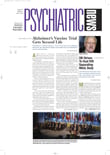The Viewpoints article in the February 4 issue by Dr. Ahmed Okasha, president of the World Psychiatric Association (WPA), titled “WPA Continues to Pursue Concerns About Chinese Psychiatric Abuses,” does not tell the whole story.
First, Dr. Okasha writes that the Soviet psychiatric association, the All-Union Society of Psychiatrists and Neuropathologists, resigned from the WPA and was not expelled. The truth is that the WPA adopted such a pusillanimous approach to blatant Soviet abuse that it took many years before it was forced, against its will, to act against the Soviet association. Eventually, however, it became so clear to the USSR that the All-Union Society would be expelled at the Vienna Congress (in 1983) that it resigned shortly before the congress convened. In other words, the association jumped before it was pushed.
Second, Dr. Okasha writes that the “improvement” in the USSR was due to regime change. In fact, before Boris Yeltsin dissolved the USSR, political abuse of psychiatry had ceased—it had stopped under Mikhail Gorbachev, general secretary of the Communist Party and president of the USSR. Since then there have been isolated, but still too many, cases of psychiatric abuse, but they have occurred sporadically at a local level and not as part of a systematic campaign of political abuse, such as what appears to be going on in China.
We, the Geneva Initiative on Psychiatry, and many others have pointed out to the WPA that the vast majority of Chinese psychiatrists are good, ethical colleagues who almost certainly abhor political abuse and do not practice it. The point is that political abuse goes on at a governmental level, that is, through the security organs, just as Soviet abuse was essentially dictated by the MVD and KGB. Expulsion of the Chinese Psychiatric Society from the WPA would be one very significant way to make the Chinese government appreciate its pariah status in world psychiatry.
Finally, I believe that it is a misuse of terminology to continue to refer to the abuse of psychiatry in China as a “Falun Gong problem.” A very large number, perhaps even the majority, of the victims of political abuse in China belong to the Falun Gong, but not all of them. Dissidents of all types, whistleblowers, trade unionists, and many others have found themselves locked up in psychiatric hospitals, or Ankangs (the notorious equivalent of the equally notorious Soviet “special hospitals”).
